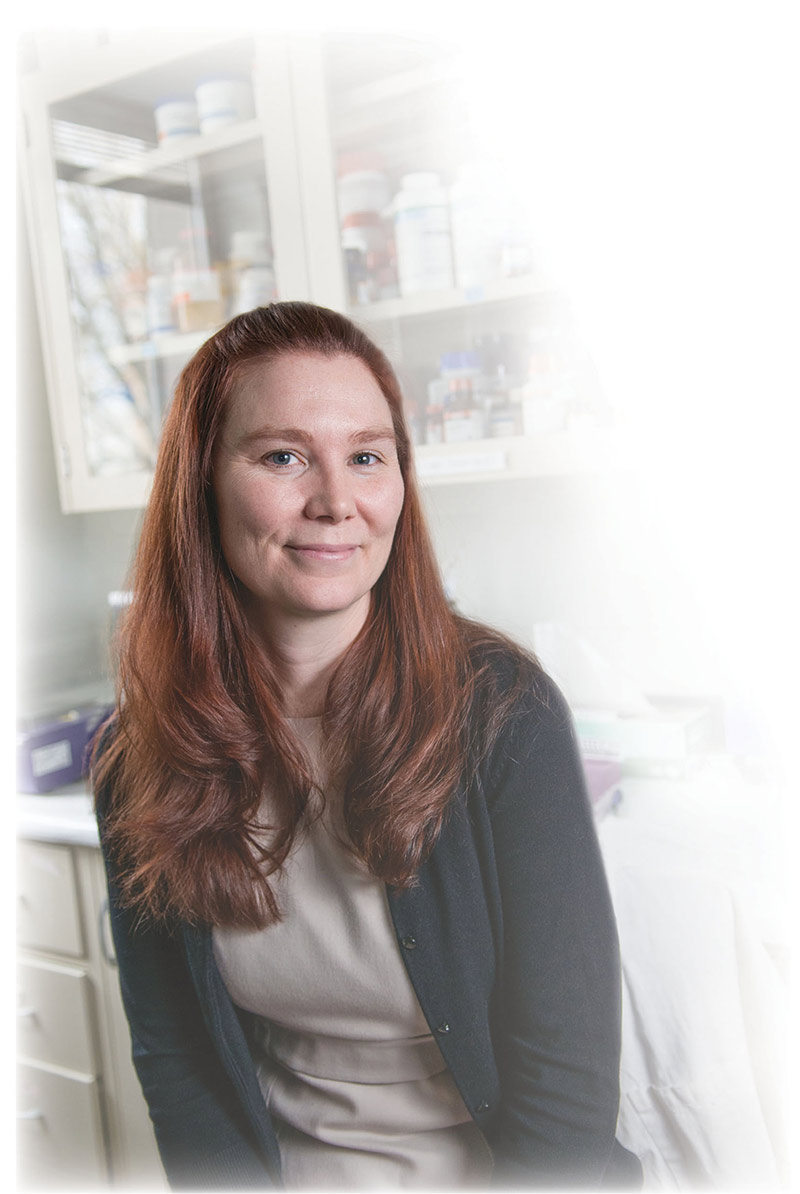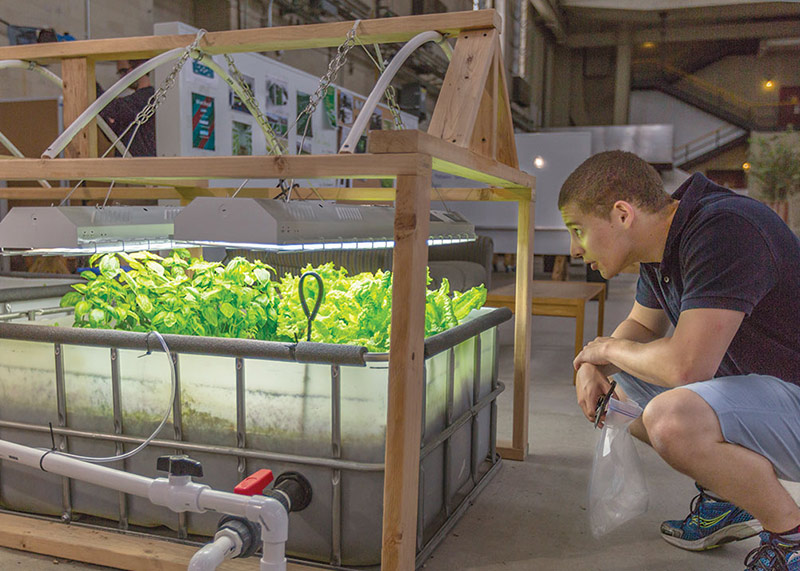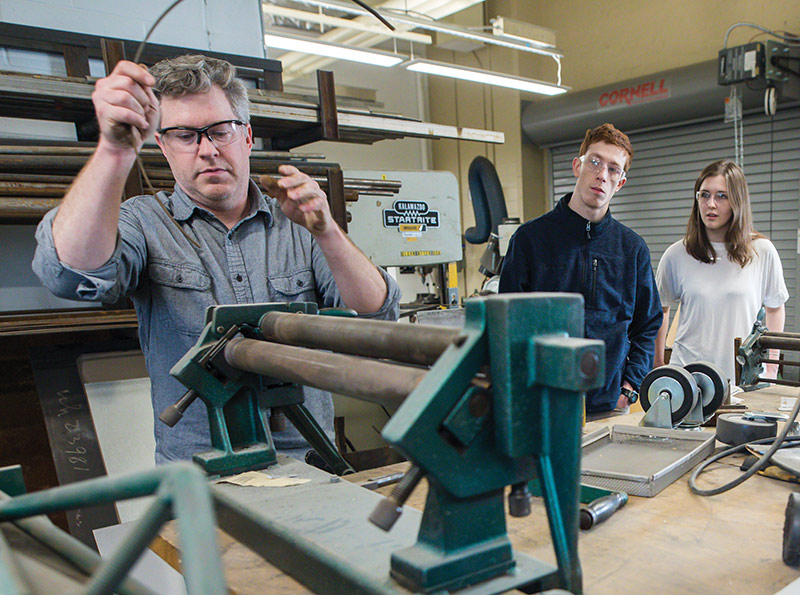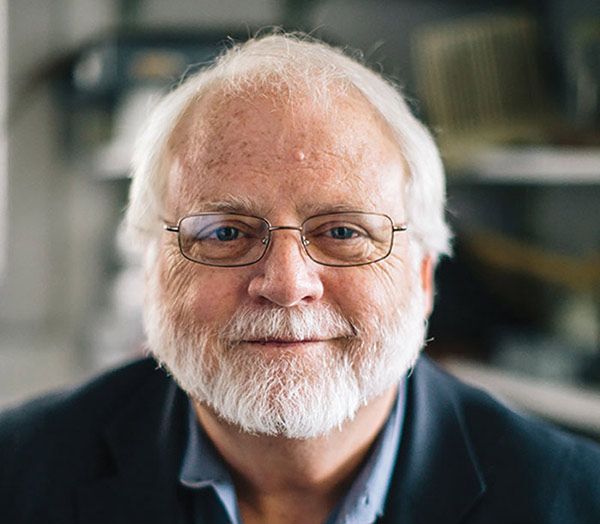 It was the ugliest prototype you could imagine, a cross between a poorly maintained aquarium and a plumbing experiment gone horribly wrong.
It was the ugliest prototype you could imagine, a cross between a poorly maintained aquarium and a plumbing experiment gone horribly wrong.
Bacteria had started growing on it. It smelled bad. It was made of acrylic, but her team hadn’t known how to glue acrylic so it was kind of a mess. But it worked.
The bench scale, three-stage bioreactor Sabrina Jedlicka and her team had built for their capstone project during their senior year could actually remediate the sugary waste produced during food manufacturing. The kind of waste that, when released into aquatic ecosystems, causes microorganism blooms that degrade water quality and harm wildlife.
“Our team was given this really open-ended design challenge from a professional society,” says Jedlicka, associate professor of materials science and bioengineering. “They just said, ‘Remediate sugary waste.’ After evaluating many options, we decided to build a bioreactor. At the end of the year, everyone, especially our team, was surprised that this crazy contraption worked. It was not an elegant design; it was downright ugly, but we were so proud.”
Jedlicka will never forget that experience—the teamwork, the aha moments, the sense of ownership. As she takes the lead of an ambitious effort to grow Lehigh’s renowned Integrated Product Development program (IPD) into a campuswide, interdisciplinary capstone design program, one of her goals is to ensure her students leave the course with a similarly unforgettable memory.
“Capstone design should be a joyous experience,” she says. “I vividly remember realizing, I learned this concept as a sophomore, and this skill last semester, and it turns out these things actually are related! They do apply to solving engineering problems! The capstone represents that moment in your academic career when you get to integrate the concepts from your coursework; during the capstone experience, students should see how the physical, the analytical, the technical, and the other skills they have gained fit together.”
According to Jedlicka, growing the IPD program to include projects that appeal to a broader base of students—and finding new ways to incorporate students from other majors across campus—is a natural evolution of Lehigh's heritage in easing the boundaries between the classroom and real world problems.
“Communicating across disciplines is critical to addressing the world’s challenges, so we need to train our students to think beyond these disciplinary silos,” says Jedlicka. “The best way to prepare them is to give them projects with no easy solutions; projects that require a team approach. We want them to work together, applying their unique skillsets and perspectives to problems they would encounter in the workforce.”

When a team of Rossin faculty came together to increase overall student engagement in experiential learning, the plan to broaden the IPD program, collaborating with other successful programs across campus, quickly rose to the top of their to-do list.
“Several successful project and capstone programs exist at Lehigh, both within and across departments, including the Technical Entrepreneurship program that housed IPD for the last few years,” says Jedlicka, who was part of the faculty envisioning team. “And, with the rise of other innovative teaching modes around campus, such as Lehigh’s Mountaintop Initiative and the impact of the Lehigh University KEEN partnership in rethinking our approach to curricular design, collaborating across these programs to ensure that students find joy in their capstone design is a natural next step.”
Jedlicka notes that, if nascent plans to reconfigure swaths of Packard Lab are successful, the program will eventually have a home in a creatively appointed “maker space” that will facilitate teaming and project management.
“We are thinking big,” she says, “just like we ask of our students. If we can make this happen, this will in some ways be a return to Packard Lab’s origin story as a hub of student innovation and hands-on, project-based learning.”
This year, 188 students on 34 teams are working closely with a faculty advisor, senior peer mentor (a student who recently completed the program), and sponsor mentor. Along the way, they present their projects in a variety of venues and contexts, such as the Lehigh Design Expo, now in its second year.
 “There’s stuff flying around the room, it’s noisy,” says Jedlicka. “You can feel how excited the students are about what they’ve done. Some of them have never built anything before, so this is huge for them, to be able to hold something in their hand and say, ‘We did this. This is ours.’”
“There’s stuff flying around the room, it’s noisy,” says Jedlicka. “You can feel how excited the students are about what they’ve done. Some of them have never built anything before, so this is huge for them, to be able to hold something in their hand and say, ‘We did this. This is ours.’”
Sponsors get plenty of benefits, too. While the program is educational, the student teams strive to bring value to the sponsor. Product feasibility, customer and stakeholder needs, manufacturing strategies, potential risks, intellectual property analysis, and product concept generation are all part of what students do as part of this active learning experience. Plus, sponsors make connections with the students who are working on their project; a value to both the company recruiting future employees and the students who will eventually be seeking employment.
When her capstone project was completed last year, bioengineer Anne Behre ’19 wasn’t quite ready to walk away. So she’s back this semester as a senior peer mentor, helping guide students that have since taken over her team’s work on an ongoing project to develop and refine an HIV-monitoring device.
“It was the most rewarding project I’ve done at Lehigh,” says Behre. “People were working together and teaching each other. I learned a lot of lab skills that I wouldn’t have otherwise. It was hard and it was time-consuming, but at the end I was so proud of myself and my team. As a direct result of all that time and effort, we ended up with something real.”
Story by Christine Fennessy, Staff Writer, P.C. Rossin College of Engineering and Applied Science, Lehigh University

